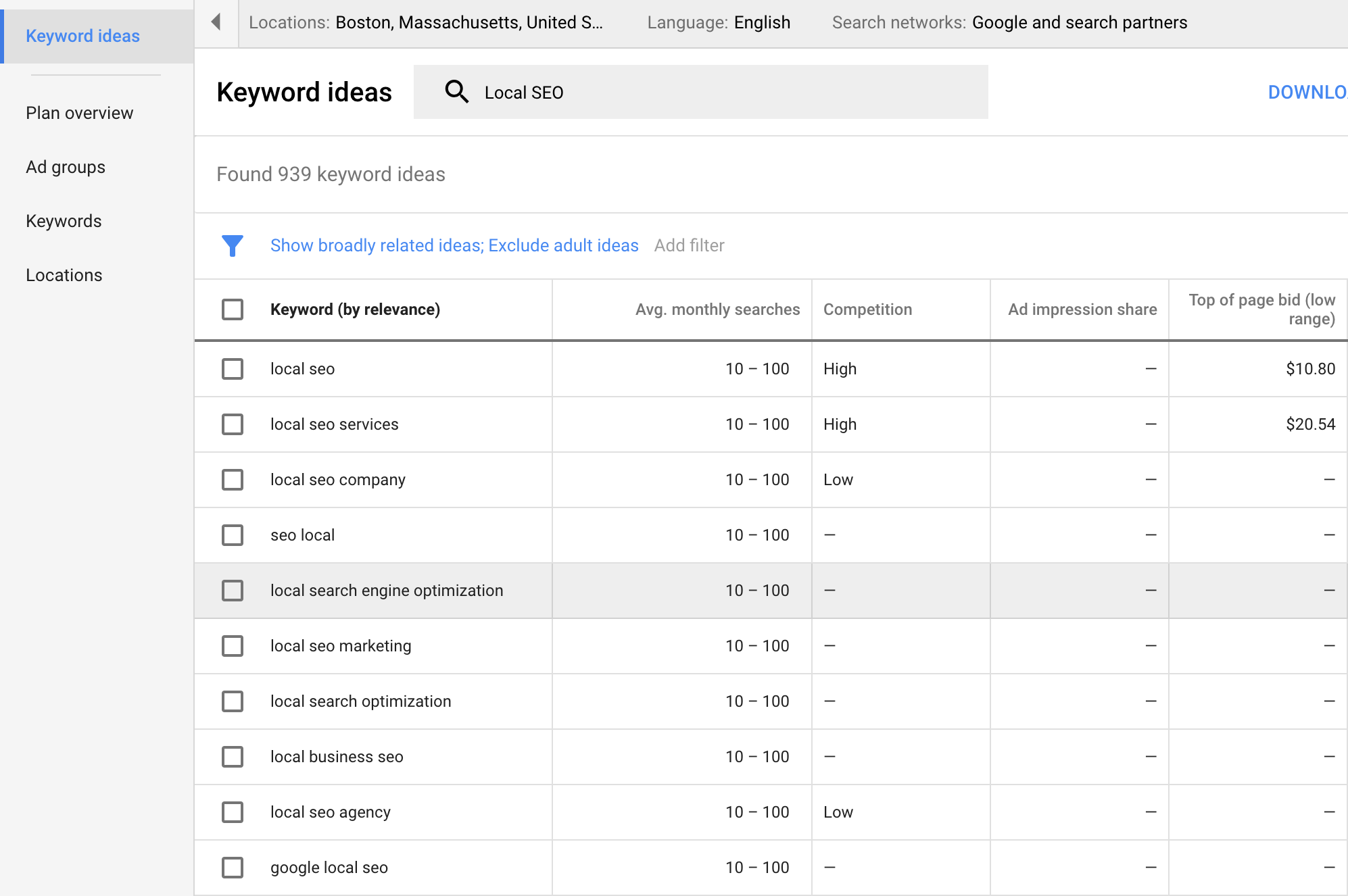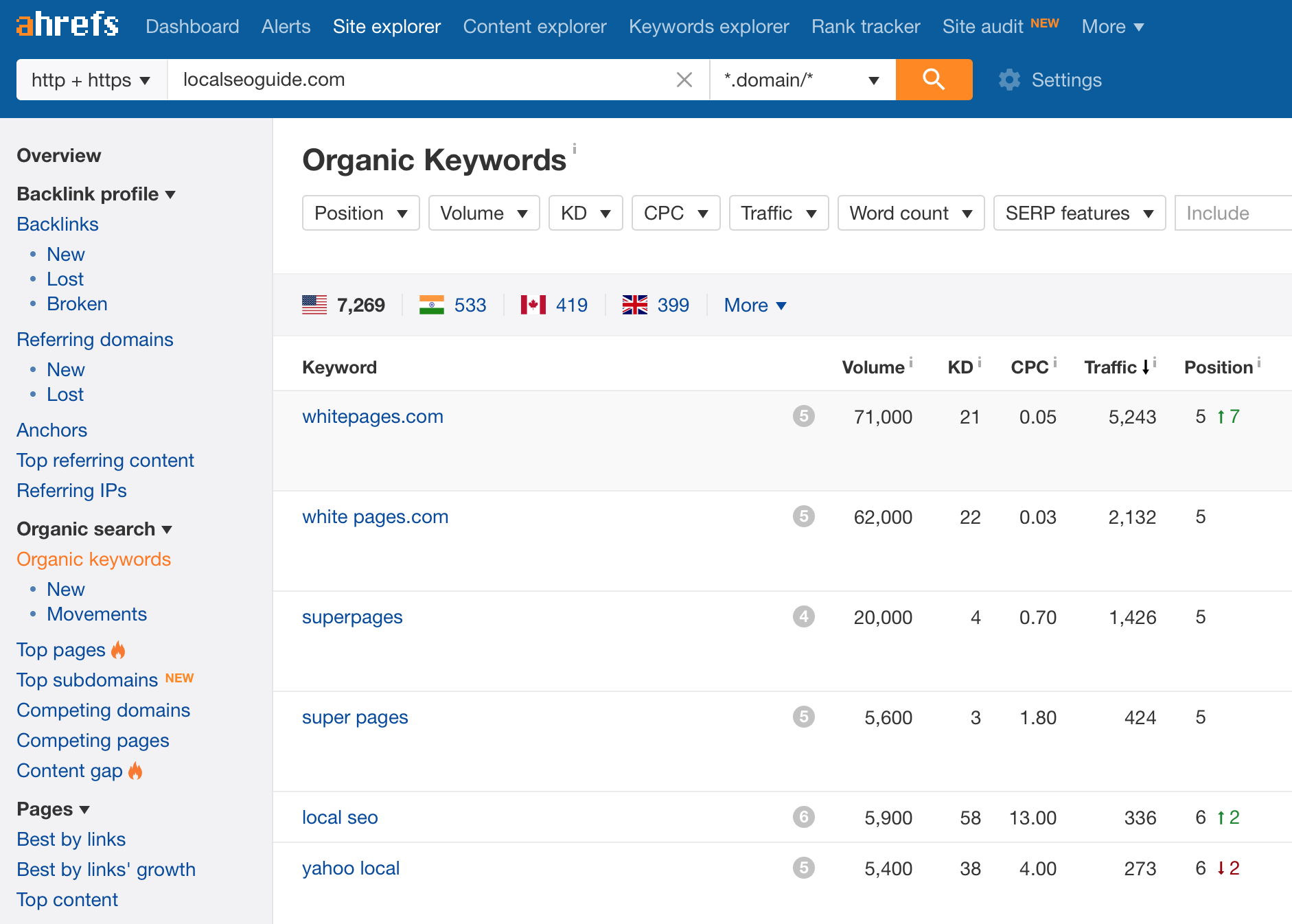What is Keyword Research?
Keyword research is a process used to find popular search terms people type into search engines. Appropriately done, keyword research will give you a list of words that your target market is using and help you create content to attract those visitors. Keyword research is the first step of any successful SEO campaign, local or organic.
Early on in the SEO industry keyword research was used to stuff pages with as many copies of the same term and its variants as possible. SEO has evolved a lot since then. Search engines, Google, in particular, want websites to focus on the user, not the search engine. Focusing on users means creating great content that they want to read. It’s no longer about keyword density and stuffing. Now the search engines rank you for keywords when they think you’re delivering the most relevant content for the user. This new focus has changed which keywords you should be researching and using in your content.
What is different about Local Keyword Research?
Organic SEO, Regular SEO, National SEO, Enterprise SEO, it has many names, but for the most part, they are the same thing. It’s the right SEO strategy for businesses trying to capture a nationwide or worldwide audience. The focus here is on more generic keywords with substantial search volume and no local indicators (like a city name). A good example here would be “Keyword Research.”
Local SEO is different because it is more focused on small businesses that have locations in specific cities and want search traffic from people in those cities. For Local keyword research, you need to find keywords that work in the service areas you or your client serves. There isn’t much of a need for Snow Removal in southern Florida, so nobody in that area should be optimizing for that keyword. To stick with our example from above, “Keyword Research” is great for Organic SEO and “Keyword Research Boston” is what you would use if you wanted to win traffic from Boston area searchers who put the city in their search.
Keyword Research Tools for Local SEO
Google Ads Keyword Planner (GAKP)
Initial Steps:
- Visit Google Ads and log in with a Google Account. If you have never done this, it will create a Google Ads account and log you in.
- Click on the Tools icon and Keyword Planner.
- Click on Find new keywords.
- On this next screen, you need to enter a base keyword, something that describes your industry. You can also enter a direct competitors URL here. For me, running Local SEO Company, I would enter: Local SEO, and click GET STARTED.
- On the right side click on Locations.
- Click the big + button and type in the city you want to target. For me, that would be Boston. It will auto-complete, and you can select the right one from the list. Now hit the X next to the United States to remove the national results, and click SAVE.
- Click back on Keyword ideas, and you’ll see the keywords with new lower monthly searches, narrowed down to the area you’ve selected.
Now that you’ve got results you have to dig through the keywords and find the ones you think you can write content for and win.
SEO PowerSuite Rank Tracker
This tool is excellent for finding the keywords you already rank for, but might not know. With these, you can optimize existing content better, and move up the ranks far faster than with brand new content. You can also find keywords that Google thinks you should be optimizing specific pages for using the Google Ads by Target Page tool.
Finding search terms you already rank for.
This method requires you to have Google Search Console setup already.
Ranking for keywords that you weren’t even trying for is pretty standard. Google’s engineers are smart, and the search engine ranks you for related keywords. Rank Tracker can show you these keywords.
Using these keywords and re-optimizing their pages can get you quick gains in your rankings. A bit of re-working the on-page SEO is far easier than creating entirely new content.
I always think of it like this, Google’s engineers are probably a lot smarter than me so I should look at what their software thinks my site should rank for.
Steps for finding already ranking keywords in Rank Tracker:
- Start Rank Tracker (after downloading it if you don’t have it installed already of course)
- Click on New Project and enter your website. For us it is https://localseocompany.net/
- The next screen wants to connect to your Google Ads (formerly Adwords) and Google Analytics accounts. Use the buttons to log in to both.
- Click Next and it will show you the keywords it pulled from Google Analytics, you can edit them if you want.
- Click Finish and wait for the progress bar in the bottom left to finish.
- On the left sidebar click on Keyword Research and then Ranking Keywords.
- Enter your URL at the top, again for us its https://localseocompany.net/ and click Search.
- Wait for it to finish, progress bars will be at the bottom left of your screen.
You now have new keywords to review. These are keywords that your website is already ranking for organically.
Ahrefs Site Explorer
This section requires an account on ahrefs.com, the trial will work fine.
Ahrefs monitors over 130 million keywords in the US. They have a fantastic database, and it knows your competitors. We use ahrefs Site Explorer to research our competitor’s high ranking keywords.
Instructions:
- Log in at ahrefs.com.
- Click on Site Explorer.
- Enter one of your competitor’s domains, and make sure the drop-down selector says “*.domain/.”
- Click Explore to get the results.
- On the left side click on Organic Keywords.
Now you are looking at your competitor’s keywords and the page that’s ranked. This ahrefs tool is a great way to find the keywords that are driving in business for your competitors, and it helps you get ideas for new content you need to create.
Conclusion
There are hundreds of methods for doing good keyword research, we’ve shown a few here. If you followed the Rank Tracker method you probably noticed the 20+ other tools and methods built into that SEO tool. Play around with it, it does a lot more than what we showed here.
At this point, you should be making a plan for new content. Now that you have these great keywords, the only way to get better rankings is to create new content or re-optimize your existing content.
If this was overwhelming and you want some help, hire us and we’ll do all this work for you!






